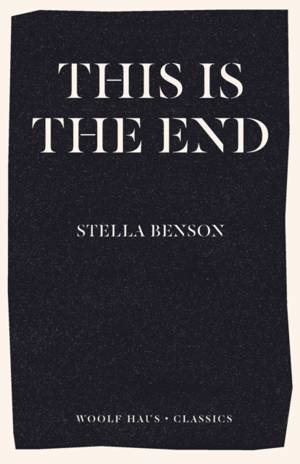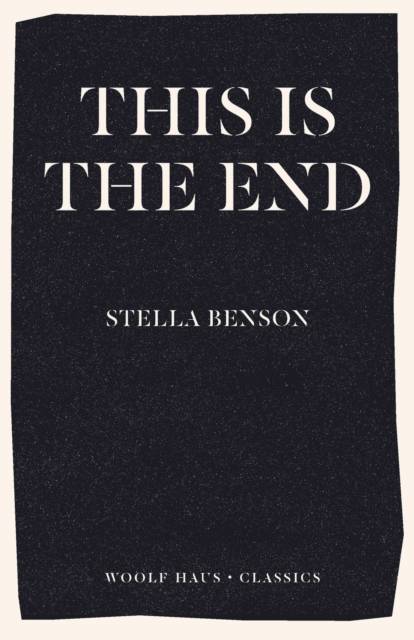
- Retrait gratuit dans votre magasin Club
- 7.000.000 titres dans notre catalogue
- Payer en toute sécurité
- Toujours un magasin près de chez vous
- Retrait gratuit dans votre magasin Club
- 7.000.0000 titres dans notre catalogue
- Payer en toute sécurité
- Toujours un magasin près de chez vous
Description
"Stella Benson will always be something of a 'writer's writer.' Excellent workmanship joined to insight ... Gifted." - The New York Times
This is the End is one of the most beautiful and poignant books in the English language. A psychological work of speculative fiction set against a real life backdrop: London during World War I. This Is the End is a story of identity and social class set in a London neighbourhood. Years ahead of her time, Stella Benson writes her metafiction with a light and airy touch - technically gifted, emotionally-charged and raw, a rare gift indeed.
Juxtaposing dreams and fantasies with the horrors of World War I, the result is surreal and beautiful, horror that is undiluted and sadness that is not diminished by any lasting comfort.
"Stella Benson was a true original, and This Is The End can be read either as a bizarre, witty comedy with a hidden social commentary, or ... something even stranger, and (perhaps) closer to genius. It's nearly a century since This Is The End was written, and I think she might still be ahead of her time." - Simon Thomas, Shiny New Books
"Benson leaps to the fictional equivalent of differential geometry ... [She] also manages to address a profound issue about the relationship between perception and reality that no less weighty a thinker than Ludwig Wittgenstein was grappling with at roughly the same time. An unrecognised precursor to much of the post-modernist fiction that would be written after the Second World War. Benson belongs in the same canon as Calvino, Borges, and Queneau." - Brad Bigelow, Neglected Books
"I scarcely know how to praise her, for her gifts are so elusive and so great." - Sheila Kaye-Smith
About the author
Between the First and Second World Wars Stella Benson ranked high among English novelists, spoken of in the same breath as Virginia Woolf or Katherine Mansfield. Witty, humorous and satirical, she was a shrewd observer of human nature; but she also looked at the world with a poet's eyes, as if startled by its beauty and oddness. Stella won the admiration and society of some of the foremost writers of the time - the Woolfs, Winifred Holtby and H. G. Wells. International acclaim greeted her novels and she seemed set for still greater success when in 1933, aged only forty-one, she died.
A personality of fascinating complexity; a gay social character and a profound introspective; a fantasist and a practical achiever; an intensely female woman deeply unsure of her own femininity; a semi-invalid determined to live her life to the full.
Undeterred by the illness that dogged her all her life, Stella shook off her comfortable background and threw herself into women's suffrage, did wartime social work in London's East End and laboured on the land. She travelled the world, visiting the USA, India, Japan and Hong Kong, and her marriage to a member of the Chinese customs service took her to live in remote outposts of China.
A brave and remarkable woman who produced some of the most original fiction of her day.
'The most enchanting, most individual, of English writers." - Rose Macaulay
Spécifications
Parties prenantes
- Auteur(s) :
- Editeur:
Contenu
- Nombre de pages :
- 144
- Langue:
- Anglais
- Collection :
Caractéristiques
- EAN:
- 9781922491480
- Date de parution :
- 05-11-21
- Format:
- Livre broché
- Format numérique:
- Trade paperback (VS)
- Dimensions :
- 140 mm x 216 mm
- Poids :
- 158 g

Les avis
Nous publions uniquement les avis qui respectent les conditions requises. Consultez nos conditions pour les avis.






